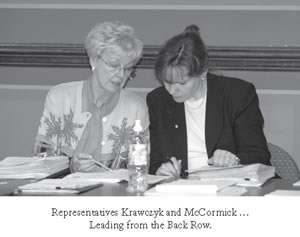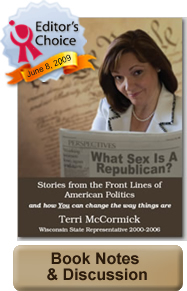 Looking back on things, there is no doubt in my mind that my freshman year chairmanship of the speaker’s Task Force on Health Insurance Partnerships for Local Governments was designed to keep me out of trouble. After the Crandon Mine fiasco, it was a wise appointment by Speaker Scott Jensen to keep me busy, studying what was perceived as an impossible issue, that of health-care costs.
Looking back on things, there is no doubt in my mind that my freshman year chairmanship of the speaker’s Task Force on Health Insurance Partnerships for Local Governments was designed to keep me out of trouble. After the Crandon Mine fiasco, it was a wise appointment by Speaker Scott Jensen to keep me busy, studying what was perceived as an impossible issue, that of health-care costs.
It was well known that the skyrocketing costs of local government health insurance was steadily rifling up the costs of property taxes. The issue was sticky and it would boil over with testimony from school board members around the state, who would echo the concerns of counties, municipalities and townships.
“Health insurance costs” for public employees was a traceable escalation of costs that impacted taxpayers’ wallets directly. Unlike the business sector, health-care costs for local governments could be made transparent and accountable. As the task force chairwoman, I shaped the issue by working with my three attorneys to draft legislation that would provide mechanisms for health-cost sharing that didn’t exist before.
The politics were basic, old-style politics; poised to pit public employee unions against the taxpayer. As a result, this issue of local government insurance costs created a political time bomb. I’m quite sure that my front-row leadership thought that I would pull the pin and go up and smoke with the issue. I saw things differently: my focus would be to create listening groups statewide and then find the common ground to solve the problem. Workable solutions would need to provide market forces to lower health insurance costs and thereby put more money into employees’ paychecks as a result.
The only problem with using market forces was with the state’s largest teachers union, the Wisconsin Education Association Council (WEAC). The WEAC and its insurance company, WEA Trust, are one in the same. The union owned its own insurance company and therefore didn’t want to compete with other insurance companies. In fact, WEAC’s argument remains the same today—they have the Cadillac of insurance policies for their members and the public should just pay more, be taxed more and spend more to pay for it.
Does the term “conflict of interest” come to mind? The fact is that countless teachers were requesting help from my office to reduce their health insurance costs so that they would have more money left in their paychecks. Further, the testimony my committee heard from school board members across the state confirmed that WEA Trust not only didn’t like competition, but they also were willing to intimidate school board members to maintain their corner on the insurance market.
 This “Cadillac” health insurance company not only had a conflict of interest in bleeding income away from school teachers, but it also held their school boards hostage with their rates.
This “Cadillac” health insurance company not only had a conflict of interest in bleeding income away from school teachers, but it also held their school boards hostage with their rates.
Sadly, high health insurance costs are not in the interests of teachers, nor are they in the interests of school boards and taxpayers struggling with decreasing budgets for basic classroom materials for students.
As I held a series of committee hearings, information sessions and statewide forums on the topic of reducing health insurance costs for local governments, I heard many recurring themes. School board members, in testimony, recounted the burden of health-care insurance costs on ever shrinking school budgets. Despite this, accounts of intimidation and scare tactics were mounting, aimed at school board members who supported alternate insurance coverage.
The proposals centered around the solution of a transparent bidding process, which would require local governments to take a minimum of three health insurance bids and then post those bids on the Internet for the press and the public to see. After weeks of testimony and statewide listening sessions, my proposals for health-care insurance costs became crystallized.
The State Association of Administrators, the League of Municipalities, the Alliance of Cities, and the Counties Association all came together to lobby on behalf of my proposals. Unfortunately, with what should have been a slam-dunk initiative to save dollars in local government employees’ paychecks became a ping-pong ball, with my party as one of the main detractors.
When I called for the vote, it was not surprising that the WEAC would control the votes of all the Democrats. What was amazing to me in 2003 was the roadblock put in place by my own party members. The highest ranking member of my Health Care Cost Committee was also second in command on the House Assembly Joint Finance Committee, Mike Huebsch. Rep. Huebsch was a former staffer, young, slick, connected and ambitious.
It was the odd conversation with Rep. Huebsch that made me aware that my party’s front-row leadership didn’t necessarily want to solve the health-care cost crisis for local units of government.
We were near the close of our long months of work on a package of reforms that would break ground in using large prescription drug purchasing pools to leverage down the costs of prescription drugs.
After a final break in discussions, I called for a break before the final vote on the package.
That is when Rep. Huebsch confronted me in the hallway, just outside our hearing room. “I don’t know if I can vote on your health care package,” he said.
I gave him a puzzled look and said, “What? You sat in on all the proceedings, you watched me author and write all the initiatives, you heard all of the testimony and pleas for help. Why wouldn’t you vote for the competitive bid package?”
He retorted, “We won’t underestimate you again.” His statement spoke volumes. I did not choose this battle, but I would not run from it.
Now, here is where the story gets more interesting. The speaker of the Republican house, who appointed me to the post of task force chairwoman, left his seat due to felony indictments. But he remained in the legislature, acting as a shadow speaker.
Here’s the interesting part. The new speaker, a junior speaker, was the same young man who…To continue reading this book, get your copy of “What Sex is a Republican” in paperback or Kindle edition on Amazon.
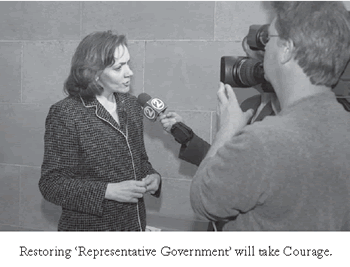 1. It will require a free and appropriate press, one that is unencumbered by media buys and marketing departments. A free press must be engaged in research, issues and fact reporting.
1. It will require a free and appropriate press, one that is unencumbered by media buys and marketing departments. A free press must be engaged in research, issues and fact reporting. Power, despite what some would have you think, is not reserved for the heavily financed political-machine candidates, who too often sit in the front rows in our state and federal capitols. Real Republican forms of democracies derive from the people who elect representatives to speak and act for them in public office.
Power, despite what some would have you think, is not reserved for the heavily financed political-machine candidates, who too often sit in the front rows in our state and federal capitols. Real Republican forms of democracies derive from the people who elect representatives to speak and act for them in public office.
 The year was 2006, and I was receiving more push back than usual on a veterans property tax bill that I wrote, with the help of Harold Grimes, a highly active and distinguished Vietnam veteran. The bill would have provided property tax relief for our returning veterans from Afghanistan and Iraq, as well as other veterans, with a 100 percent combat disability. The subject was clearly property tax relief, yet in a matter of a few hours after the bill’s introduction, the focus changed.
The year was 2006, and I was receiving more push back than usual on a veterans property tax bill that I wrote, with the help of Harold Grimes, a highly active and distinguished Vietnam veteran. The bill would have provided property tax relief for our returning veterans from Afghanistan and Iraq, as well as other veterans, with a 100 percent combat disability. The subject was clearly property tax relief, yet in a matter of a few hours after the bill’s introduction, the focus changed.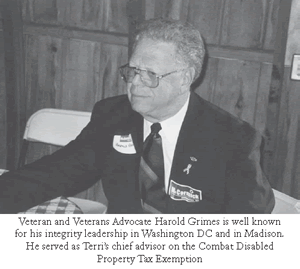
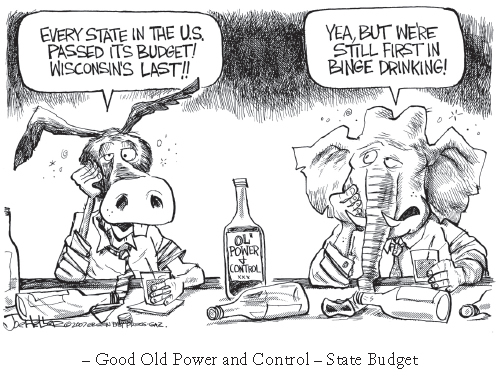 I will never forget the late-night budget standoff in 2003, shortly after my second oath of office, in the Wisconsin state legislature. My committee appointments were as the chair of the Economic Development Committee and vice chair for a second term in office on the House Judiciary Committee.
I will never forget the late-night budget standoff in 2003, shortly after my second oath of office, in the Wisconsin state legislature. My committee appointments were as the chair of the Economic Development Committee and vice chair for a second term in office on the House Judiciary Committee. Looking back on things, there is no doubt in my mind that my freshman year chairmanship of the speaker’s Task Force on Health Insurance Partnerships for Local Governments was designed to keep me out of trouble. After the Crandon Mine fiasco, it was a wise appointment by Speaker Scott Jensen to keep me busy, studying what was perceived as an impossible issue, that of health-care costs.
Looking back on things, there is no doubt in my mind that my freshman year chairmanship of the speaker’s Task Force on Health Insurance Partnerships for Local Governments was designed to keep me out of trouble. After the Crandon Mine fiasco, it was a wise appointment by Speaker Scott Jensen to keep me busy, studying what was perceived as an impossible issue, that of health-care costs. This “Cadillac” health insurance company not only had a conflict of interest in bleeding income away from school teachers, but it also held their school boards hostage with their rates.
This “Cadillac” health insurance company not only had a conflict of interest in bleeding income away from school teachers, but it also held their school boards hostage with their rates.